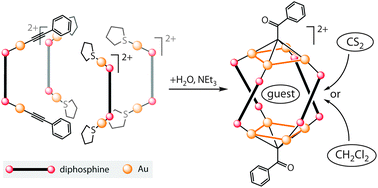A collaboration of Finnish and Russian scientists has resulted in the creation of a gold-diphosphine helical cage that plays host to small organic molecules, like dichloromethane and carbon disulphide. Igor Koshevoy and colleagues from the University of Eastern Finland, and Sergey Tunikv and co-workers from St. Petersburg State University have shown that the assembly of these cages occur via an unprecedented transformation.
Why not discover what is so unprecedented about the transformation process and download the article today? The authors have published their results in ChemComm, which will be free to access until the 9th December.











